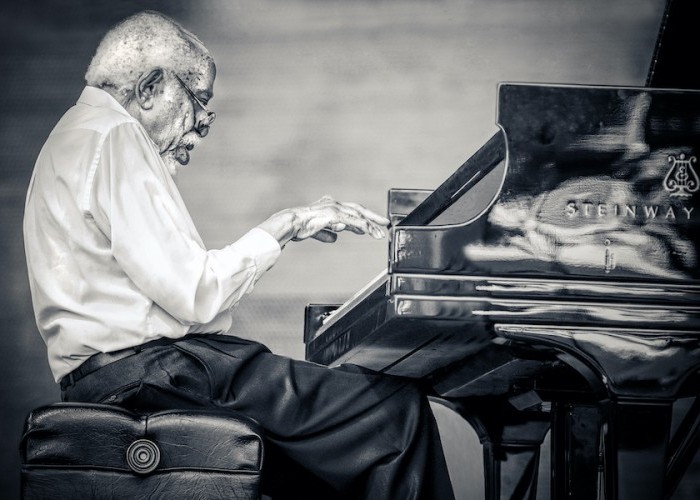Jan 13, 2026 2:09 PM
More Trump-Kennedy Center Cancellations
The fallout from the renaming of the John F. Kennedy Center for the Performing Arts to include President Donald…

Barry Harris was an extraordinary jazz pianist and a devoted keeper of the bebop flame.
(Photo: Michael Jackson)Pianist Barry Harris, an NEA Jazz Master who devoted his life to playing bebop and teaching the language of straightahead jazz improvisation to younger generations, died Dec. 8 of complications from COVID-19 at a New Jersey hospital. He was 91.
A product of the 1950s Detroit scene that produced the likes of brothers Hank, Thad and Elvin Jones, vibraphonist Milt Jackson, guitarist Kenny Burrell, pianist Tommy Flanagan and dozens of other Motor City jazz icons, Harris was a consummate sideman who worked alongside the art form’s top progenitors for more than 70 years. He also performed as a leader and recorded more than 25 albums under his own name, including several acclaimed releases on the Prestige and Riverside labels. Despite suffering a stroke in 1993, Harris remained active into his nineties, playing at venues around New York and leading weekly bebop workshops. In November, he performed in a high-profile concert featuring this year’s recipients of the NEA Jazz Masters award at Flushing Town Hall in Queens, New York.
As a teenager in the ’40s, Harris became fascinated with the complexly structured improvisations of Charlie Parker, Dizzy Gillespie, Bud Powell, Thelonious Monk and other progressive-minded instrumentalists who sparked the then-thriving bebop movement. Harris quickly picked up on the unwritten rules of the genre and began to formulate ways of codifying them for practice and study. In addition to his rising profile as a first-call pianist, he soon found himself in demand as a teacher and was frequently sought after by more experienced pros who wanted to learn what were essentially Harris’ instructions for the proper way to bop. Trumpeter Donald Byrd, bassist Paul Chambers, trombonist Curtis Fuller, and saxophonists Pepper Adams, Charles McPherson and Joe Henderson all studied with Harris, who shared some of his ideas with John Coltrane when the saxophonist came through town on tour.
During the ’50s, Harris became the house pianist at Detroit’s Blue Bird Inn, where he performed with Pepper Adams and Elvin Jones and backed visiting bandleaders including Miles Davis. In addition to being extremely active on the Detroit scene, he toured with briefly in a group with Max Roach and Sonny Rollins. He moved to New York in 1960 to play with Cannonball Adderley’s group, eventually settling into the Weehawken, New Jersey, home of the legendary jazz benefactor Pannonica de Koenigswarter (where he was housemates with Monk for a while) and establishing himself as one of the greatest jazz pianists and hard-bop improvisers of the modern era.
He played on such classic albums as Adderley’s Them Dirty Blues (1960), Lee Morgan’s The Sidewinder (1964), Coleman Hawkins’ Wrapped Tight (1965), Dexter Gordon’s Gettin’ Around (1966) and Sonny Stitt’s Constellation (1972).
As a leader, Harris’ more notable recordings included the trio LPs At The Jazz Workshop (1960), Chasin’ The Bird (1962), Preminado (1961), Magnificent! (1970), Vicissitudes (1975) and Live In Tokyo (1976). Other recommended listening includes Harris’ solo piano recordings The Bird Of Red And Gold (1982) and Solo (1961); Barry Harris Plays Tadd Dameron (1975); For The Moment (1984); and Live At Maybeck Recital Hall, Vol. 1 & 2 (1990).
Harris is survived by his daughter, Carol Geyer. DB

Belá Fleck during an interview with Fredrika Whitfield on CNN.
Jan 13, 2026 2:09 PM
The fallout from the renaming of the John F. Kennedy Center for the Performing Arts to include President Donald…

Peplowski first came to prominence in legacy swing bands, including the final iteration of the Benny Goodman Orchestra, before beginning a solo career in the late 1980s.
Feb 3, 2026 12:10 AM
Ken Peplowski, a clarinetist and tenor saxophonist who straddled the worlds of traditional and modern jazz, died Feb. 2…

The success of Oregon’s first album, 1971’s Music Of Another Present Era, allowed Towner to establish a solo career.
Jan 19, 2026 5:02 PM
Ralph Towner, a guitarist and composer who blended multiple genres, including jazz — and throughout them all remained…

Rico’s Anti-Microbial Instrument Swab
Jan 19, 2026 2:48 PM
With this year’s NAMM Show right around the corner, we can look forward to plenty of new and innovative instruments…

Richie Beirach was particularly renowned for his approach to chromatic harmony, which he used to improvise reharmonizations of originals and standards.
Jan 27, 2026 11:19 AM
Richie Beirach, a pianist and composer who channeled a knowledge of modern classical music into his jazz practice,…